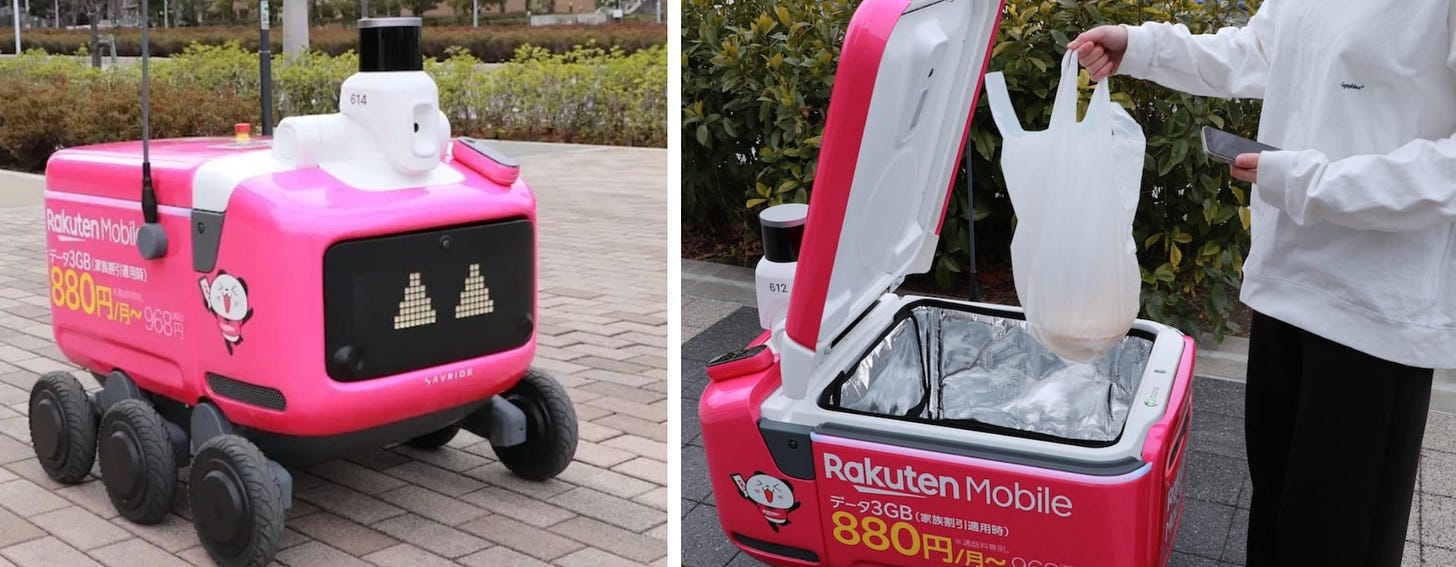Can Vending Machines Save Japan?
Part II: Salvation Through Automation
Later this month, history may be made in Japan. Despite some last-minute horse-trading, Japan is likely to get its first ever female prime minister. A one-time motorbike rider and heavy metal drummer, Sanae Takaichi is a popular figure on the right of Japanese politics.
But should ‘Japan’s Iron Lady’ end up taking the top job, she’ll face a disgruntled and anxious left and an in-tray that no incoming leader would relish: voter anger at high taxes and weak wage-growth, inflation creeping upwards and fresh uncertainty over America’s commitment to Japan’s security.
Dig a little deeper, and you find the really bad news. Japan’s population is shrinking by more than 2,000 people every day. A third of Japanese will soon be over the age of 65, most of them not in work and many requiring expensive and labour-intensive care. Japan’s national debt, meanwhile, is a whopping 235% of GDP.
An obvious long-term option is to try a modern twist on an old idea. In feudal Japan, if an important lord had no sons - or none worthy of his name - he could adopt a promising young candidate from elsewhere. In the 21st-century, there’s no shortage of people across East and South-East Asia, and indeed further afield, who’d be happy to be adopted into the Japanese family - if such an offer were on the table.
But Japan is a country of historically low migration, where unease about migrants - and even tourists - shows little sign of abating.
Viral videos of badly-behaved visitors continue to stack the deck of public opinion against tourists and migrant workers. See my essay for more.
The main alternative has long been robots. In Japan, so the argument goes, people are more welcoming and trusting of robots than their counterparts in the West. They have Astro Boy, we have the Terminator.
But the techno-optimism of the 2010s, which imagined Japanese hospitals and nursing homes becoming chock-full of whizzy robots, lifting patients, entertaining them, dispensing medication and even catering to their emotional needs, now looks misplaced.
The answer instead? Vending machines - and the interconnected future of which they may become a part.
Japanese dreams vs Western nightmares.
In last week’s essay I looked at the roots of this technology in centuries of ‘person-less selling’ in Japan and its culture of trust. This week, I’m going to do what no historian is supposed to: whip out my crystal ball, beckon you over to my consultation table and show you a glimpse of a possible future.
The seeds of this future have already been planted and the shoots are poking through. Some vending machines boast facial recognition married to deep learning. They know who you are, use your native language, recommend your favourite items and allow you to pay without fumbling for cash or cards.
They’ll even have a crack at guessing your mood, altering what they offer on that basis. Maybe soon they’ll evaluate the bags under your eyes and try flogging you one of Japan’s famous ‘genki drinks’ - little glass bottles whose odd-tasting liquid is stuffed with amino acids, vitamins and herbal remedies.
These machines also know what the weather’s like, and recommend products accordingly. Some analyse foot traffic and compare it with the expiry dates on their products in order to adjust prices. Others are tackling food waste by allowing bakeries and other outlets to sell near-expiry food at low prices - a modest boon for food security, where Japan has traditionally been weak.
If you’re more of a law-and-order type, you’ll be pleased to hear that anyone trying to rob or vandalise one of these machines can expect to have a high-res photo of their face shared with the police.
‘Salad Stand’ vending machines are some of the first to use dynamic pricing.
Is there anything you’d like a vending machine to do, whether in Japan or where you live? Leave me a comment…
At the top of my own wish-list would be a roving robot that trundles through train carriages selling cheap earbuds to people watching or listening to things out loud on their phones. I’d equip it with a targeted EMP capability, so that it could temporarily disable a person’s phone if they fail either to buy the buds or turn off the noise. Too much? (And am I showing my age…?)
Perhaps the most under-rated thing that some vending machines now do is communicate with suppliers to make restocking more efficient. This means that delivery drivers know what to put in their vans and what route to take between machines. This saves an estimated 10% on labour hours in a country desperately short of workers and where productivity has stagnated.
This matters because commentators tend to assume that Japan’s population decline is inevitable. I don’t think it is - or at least, it needn’t be this steep. Young people consistently tell surveys that they would like to have families but can’t afford them. A precarious employment market, tied to a raft of other economic problems, means that many choose not to take the plunge. If Japan’s productivity problems can be addressed and the economy improves the result may be more optimism and more babies.
The vending machines of old were big, boxy and static. That, too, is changing. Rakuten mobile robots have been spotted in parts of Tokyo this year, using LiDAR and remote human oversight to operate 24-hours a day and in many (though not all) types of weather. Future plans include robots serving rural communities, delivering goods to the isolated and the elderly.
They may even play a role in protecting Japan’s natural beauty. If what you need right now reaches you on the go, then fewer buildings are required to house things you might need at some point. It’s no accident that Panasonic are trialling their latest robot in Shinjuku Park.
Rakuten’s mobile delivery robots. No doubt video will soon emerge of drunken tourists riding around on the back of them…
It’s fascinating to see private companies like Rakuten and Panasonic leading the way here, supported by university researchers and government money. Where official initiatives have sometimes failed to secure public trust - a case in point being the distinctly wobbly roll-out of digital ID in Japan - companies that have spent decades establishing warm relationships with customers are finding they’re in a better position to persuade people to try new things.
Of course, as I argued last week, trust and tech go hand in hand. It wouldn’t take many toddlers being bowled over by delivery robots for people to demand companies call time on the experiment. Driverless cars face the same problem, and just recently Amazon announced the closure of its automated fresh food shops in the UK - partly over tech failures and the resulting loss of trust with customers.
Some in Japan are concerned too about the use of the biometric data collected by vending machines and by the country’s small number of unmanned shops, which use ceiling cameras to track you and your purchases. Nor has AI proven an easy sell: Japan appears close to the bottom in worldwide rankings tracking use of, knowledge about and trust in AI.
There is, in short, much to do, but everything to play for. I’ll leave you with five bits of crystal-ballery - trends that I think will matter in the coming years:
A shift from ‘care-bots’, working in sensitive settings like nursing homes, to ‘co-bots’: augmenting human capacities rather than replacing us.
Private companies leading the way in innovation and the winning of public trust, for incremental rather than radical change.
Universities and research institutes like RIKEN playing a central role in developing new technologies. On the way are autonomous mobile robots (AMRs) that use quantum sensors to navigate spaces measured in fractions of a millimetre.
Belated reforms designed to make it easier for women and the elderly to enter or re-enter the workforce.
Mainstream politicians coming under pressure from fringe parties to engage in a big-picture debate about migration, Japan’s future and what it means to be - or to become - Japanese.
Thanks for reading! If you found this useful, please share it. If you liked it, please hit the heart button. And if you loved it, then please support the future of real, honest-to-goodness writing by human beings - for as little as £2.50 per month. Not everything ought to be automated!
—
Images
Salad Stand: Japan Today (fair use).
Rakuten mobile robot: Retail Asia (fair use).






It will be especially interesting to hear what Japan's leaders say about the nature of being or becoming Japanese. We in the US have an administration that is trying to change the nature of citizenship; the goal appears to be a confused form of racial purity. We needn't worry about automation taking or augmenting jobs here because basic and secondary research have been defunded. I'm eager to see how Japan makes automation serve its people.
With the shortage of taxi and bus drivers it’s surprising that the most commercial robot, self-driving vehicles like the Waymo and Tesla ride share cars in service in Phoenix, Austin, LA and SF in the US aren’t even in testing here in Japan. Maybe the US models won’t work because they can’t handle driving on the wrong side of the road (yes, even the UK is not in the right here) or because of traffic patterns (only one lane in each direction, often blocked by right turning cars, or double parked delivery trucks) but it seems like there should be more progress here given the local robotics and automotive skills.